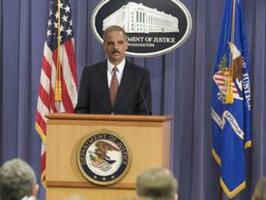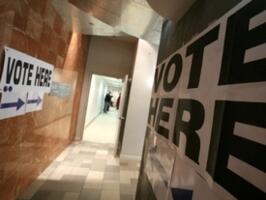Democrats Quinn, Weiner Lead GOP’s Lhota in NYC Mayoral Race
Both current Democratic frontrunners outpace Republican favorite Joseph J. Lhota in Rasmussen Reports’ first look at New York City’s 2013 mayoral race.

Both current Democratic frontrunners outpace Republican favorite Joseph J. Lhota in Rasmussen Reports’ first look at New York City’s 2013 mayoral race.

Favorables for the Tea Party have jumped since news broke that the Internal Revenue Service was targeting the grassroots movement and other conservative groups.
A new Rasmussen Reports national telephone survey shows that 44% of Likely U.S. Voters now have a favorable opinion of the Tea Party. That's up 14 points from January but still down from April 2009's high of 51% when the Tea Party protests against President Obama’s spending policies first erupted.
Forty-four percent (44%) also now view the Tea Party unfavorably, although that's down five points from earlier this year. The latest findings include 18% with a Very Favorable opinion of the movement and 25% with a Very Unfavorable one. Thirteen percent (13%) are undecided. (To see survey question wording, click here.)
The survey of 1,000 Likely Voters was conducted on May 21-22, 2013 by Rasmussen Reports. The margin of sampling error is +/- 3 percentage points with a 95% level of confidence. Field work for all Rasmussen Reports surveys is conducted by Pulse Opinion Research, LLC. See methodology.

Most voters think the Internal Revenue Service’s decision to target conservative groups was made in Washington, D.C. and that it wasn’t the only government agency going after these groups.
Just 20% of Likely U.S. Voters believe the IRS’ explanation thus far that low-level employees at its Cincinnati office made the decision to target the conservative groups. The latest Rasmussen Reports national telephone survey finds that 65% think the orders came from Washington, with 26% who think the decision was made by someone at IRS headquarters and 39% who believe someone who works at the White House made the call. Fifteen percent (15%) are not sure. (To see survey question wording, click here.)
The survey of 1,000 Likely Voters was conducted on May 20-21, 2013 by Rasmussen Reports. The margin of sampling error is +/- 3 percentage points with a 95% level of confidence. Field work for all Rasmussen Reports surveys is conducted by Pulse Opinion Research, LLC. See methodology.

Former Congressman Anthony Weiner has officially entered the race to become New York City’s next mayor. The first step is the September 10 Democratic primary, and Weiner starts out in second place behind City Council Speaker Christine Quinn.
(Want a free daily e-mail update? If it's in the news, it's in our polls). Rasmussen Reports updates are also available on Twitter or Facebook.
The survey of 745 Registered Democrats was conducted on May 21 and 22, 2013. Weiner announced his entry into the race early on the morning of the 22nd . The margin of sampling error for the survey is +/- 4 percentage points with a 95% level of confidence. Fieldwork for all Rasmussen Reports surveys is conducted by Pulse Opinion Research, LLC. See methodology.

With growing questions about Benghazi and actions taken by the Internal Revenue Service and the Justice Department, Democrats' noticeable edge over Republicans in voter trust in the area of government ethics and corruption has disappeared.
A new Rasmussen Reports national telephone survey finds that 39% of Likely U.S. Voters now trust Republicans more to handle the ethics and corruption issue. Nearly as many (37%) still trust Democrats more. Twenty-four percent (24%) are not sure. (To see survey question wording, click here.)
(Want a free daily e-mail update? If it's in the news, it's in our polls). Rasmussen Reports updates are also available on Twitter or Facebook.
The surveys of 1,000 Likely Voters was conducted on May 15-16 & 19-20, 2013 by Rasmussen Reports. The margin of sampling error is +/- 3 percentage points with a 95% level of confidence. Field work for all Rasmussen Reports surveys is conducted by Pulse Opinion Research, LLC. See methodology.

Over half of voters think there’s a chance at least one of the major controversies now bedeviling the Obama administration will still be around a year from now. They see the Internal Revenue Service’s targeting of conservative political groups and the questions surrounding Benghazi as the most likely to linger.
The latest Rasmussen Reports national telephone survey finds that 55% of Likely U.S. Voters believe it is at least somewhat likely that at least one of the major controversies now in the news will still be a major news story in a year. Forty percent (40%) consider that unlikely. This includes 22% who say at least one of the controversies is Very Likely to still be in the news versus just eight percent (8%) who think it’s Not At All Likely. (To see survey question wording, click here.)
The survey of 1,000 Likely Voters was conducted on May 19-20, 2013 by Rasmussen Reports. The margin of sampling error is +/- 3 percentage points with a 95% level of confidence. Field work for all Rasmussen Reports surveys is conducted by Pulse Opinion Research, LLC. See methodology.

The Obama administration is wrestling with several high-profile controversies these days, but voter concern about events surrounding the death last year of the U.S. ambassador in Benghazi, Libya remains little changed.
A new Rasmussen Reports national telephone survey finds that 81% of Likely U.S. Voters still think it is at least somewhat important to find out what happened in the events surrounding the death of Ambassador Christopher Stevens. This includes 55% who say it is Very Important. Only 13% feel it’s not very or Not At All Important to get to the bottom of the events last September in Benghazi. (To see survey question wording, click here.)
(Want a free daily e-mail update? If it's in the news, it's in our polls). Rasmussen Reports updates are also available on Twitter or Facebook.
The survey of 1,000 Likely Voters was conducted on May 17-18, 2013 by Rasmussen Reports. The margin of sampling error is +/- 3 percentage points with a 95% level of confidence. Field work for all Rasmussen Reports surveys is conducted by Pulse Opinion Research, LLC. See methodology.

The U.S. Justice Department's secret seizure of telephone records from the Associated Press has been drawing major headlines for several days. Voters have mixed feelings about the story, but 52% of Likely U.S. Voters think the media reacts more quickly to things that affect news organizations, reporters and their friends.
A new Rasmussen Reports national telephone survey finds that just 23% disagree and don't see media self-interest in their news choices. Twenty-five percent (25%) are not sure. (To see survey question wording, click here.)
(Want a free daily e-mail update ? If it's in the news, it's in our polls). Rasmussen Reports updates are also available on Twitter or Facebook.
The survey of 1,000 Likely U.S. Voters was conducted on May 15-16, 2013 by Rasmussen Reports. The margin of sampling error is +/- 3 percentage points with a 95% level of confidence. Field work for all Rasmussen Reports surveys is conducted by Pulse Opinion Research, LLC. See methodology.

Voters now give the edge to state governments over the federal government when asked who should be responsible for gun ownership laws.
Thirty-six percent (36%) think state governments should set those laws, while 34% believe the feds should have that responsibility, according to a new Rasmussen Reports national telephone survey. Seventeen percent (17%) feel gun laws should be up to local governments. Twelve percent (12%) are undecided. (To see survey question wording, click here.)
(Want a free daily e-mail update? If it's in the news, it's in our polls). Rasmussen Reports updates are also available on Twitter or Facebook.
The survey of 1,000 Likely Voters was conducted on May 13-14, 2013 by Rasmussen Reports. The margin of sampling error is +/- 3 percentage points with a 95% level of confidence. Field work for all Rasmussen Reports surveys is conducted by Pulse Opinion Research, LLC. See methodology.

Voters are closely divided over whether the U.S. Justice Department’s secret seizure of telephone records from the Associated Press was an effort to protect national security or an attempt to bully the media.
The latest Rasmussen Reports national telephone survey finds that 42% think the Justice Department’s actions were chiefly an effort to intimidate the media. But nearly as many (38%) think Justice was primarily acting out of a concern for national security. Twenty percent (20%) are not sure. (To see survey question wording, click here.)
(Want a free daily e-mail update? If it's in the news, it's in our polls). Rasmussen Reports updates are also available on Twitter or Facebook.
The survey of 1,000 Likely Voters was conducted on May 15-16, 2013 by Rasmussen Reports. The margin of sampling error is +/- 3 percentage points with a 95% level of confidence. Field work for all Rasmussen Reports surveys is conducted by Pulse Opinion Research, LLC. See methodology.

Voters still favor more gun control including a ban on semi-automatic and so-called assault-type weapons but continue to strongly oppose a complete ban on private gun ownership.
A new Rasmussen Reports national telephone survey finds that 49% of Likely U.S. Voters believe the United States needs stricter gun control laws. Forty-three percent (43%) disagree and oppose more gun control. (To see survey question wording, click here.)
(Want a free daily e-mail update? If it's in the news, it's in our polls). Rasmussen Reports updates are also available on Twitter or Facebook.
The survey of 1,000 Likely Voters was conducted on May 13-14, 2013 by Rasmussen Reports. The margin of sampling error is +/- 3 percentage points with a 95% level of confidence. Field work for all Rasmussen Reports surveys is conducted by Pulse Opinion Research, LLC. See methodology.

Most voters believe the Internal Revenue Service’s targeting of Tea Party and other conservative groups was politically motivated and think most of those involved should be severely punished.
Just 16% of Likely U.S. Voters believe the IRS investigations of these groups were a coincidence, according to the latest Rasmussen Reports national telephone survey. Fifty-seven percent (57%) think the investigations were politically motivated. Twenty-seven percent (27%) are not sure. (To see survey question wording, click here.)
(Want a free daily e-mail update? If it's in the news, it's in our polls). Rasmussen Reports updates are also available on Twitter or Facebook.
The survey of 1,000 Likely Voters was conducted on May 13-14, 2013 by Rasmussen Reports. The margin of sampling error is +/- 3 percentage points with a 95% level of confidence. Field work for all Rasmussen Reports surveys is conducted by Pulse Opinion Research, LLC. See methodology.

Voters are now evenly divided when asked if elections in the United States are fair today, and a solid majority continues to believe that the U.S. government does not have the consent of the governed. But the Political Class strongly disagrees.
A new Rasmussen Reports national telephone survey finds that 40% of Likely U.S. Voters now consider elections fair to voters, a 17-point drop in confidence from shortly before Election Day last year. Just as many (41%) say American elections are not fair. Nineteen percent (19%) are not sure. (To see survey question wording, click here.)
(Want a free daily e-mail update? If it's in the news, it's in our polls). Rasmussen Reports updates are also available on Twitter or Facebook.
The national survey of 1,000 Likely Voters was conducted on May 9-10, 2013 by Rasmussen Reports. The margin of sampling error is +/- 3 percentage points with a 95% level of confidence. Field work for all Rasmussen Reports surveys is conducted by Pulse Opinion Research, LLC. See methodology.

Most Americans still strongly support making English the nation’s official language and don't think they're prejudiced for feeling that way.
A new Rasmussen Reports national telephone survey finds that 84% of American Adults believe English should be the official language of the United States. Only 12% disagree. (To see survey question wording, click here.)
(Want a free daily e-mail update? If it's in the news, it's in our polls). Rasmussen Reports updates are also available on Twitter or Facebook.
The national survey of 1,000 Adults was conducted on May 10-11, 2013 by Rasmussen Reports. The margin of sampling error is +/- 3 percentage points with a 95% level of confidence. Field work for all Rasmussen Reports surveys is conducted by Pulse Opinion Research, LLC. See methodology.

Voters continue to seriously doubt that their elected representatives are listening to them.
A new Rasmussen Reports national telephone survey shows that just eight percent (8%) of Likely Voters believe the average member of Congress listens to the voters he or she represents more than congressional party leaders. An overwhelming majority (80%) believes the average congressman listens to party leaders more. Twelve percent (12%) are undecided. (To see survey question wording, click here.)
(Want a free daily e-mail update? If it's in the news, it's in our polls). Rasmussen Reports updates are also available on Twitter or Facebook.
The national survey of 1,000 Likely Voters was conducted on May 9-10, 2013 by Rasmussen Reports. The margin of sampling error is +/- 3 percentage points with a 95% level of confidence. Field work for all Rasmussen Reports surveys is conducted by Pulse Opinion Research, LLC. See methodology.

Half of U.S. voters continue to favor an immediate withdrawal of all American forces from Afghanistan, as fewer voters than ever think the United States can really win there.
A new Rasmussen Reports national telephone survey finds that 50% of Likely U.S. Voters think the United States should immediate withdraw all its troops from Afghanistan. Just 32% oppose a complete withdrawal, while 18% more are not sure. (To see survey question wording, click here.)
(Want a free daily e-mail update? If it's in the news, it's in our polls). Rasmussen Reports updates are also available on Twitter or Facebook.
The survey of 1,000 Likely Voters was conducted on May 11, 2013 by Rasmussen Reports. The margin of sampling error is +/- 3 percentage points with a 95% level of confidence. Field work for all Rasmussen Reports surveys is conducted by Pulse Opinion Research, LLC. See methodology.

Most Americans want to decrease or leave unchanged the number of legal immigrants allowed into the United States even if the government secures the border to stop the flow of illegals. A new Rasmussen Reports national telephone survey finds that just 26% of American Adults think the number of immigrants allowed to enter the country legally should be increased if the government actually secures the border and prevents illegal immigration. But 38% believe the government should decrease the level of legal immigration if the border is really secured, while 24% feel the level should be left unchanged. Eleven percent (11%) are not sure. (To see survey question wording, click here.)
(Want a free daily e-mail update? If it's in the news, it's in our polls). Rasmussen Reports updates are also available on Twitter or Facebook.
The survey of 1,000 Adults was conducted on May 6-7, 2013 by Rasmussen Reports. The margin of sampling error is +/- 3 percentage points with a 95% level of confidence. Field work for all Rasmussen Reports surveys is conducted by Pulse Opinion Research, LLC. See methodology.

Most Americans think the United States should welcome legal immigrants from around the world but believe those from countries with terrorist ties should be eyed more closely. They also think the United States should give preference to immigrants who are good for the economy.
A new Rasmussen Reports national telephone survey finds that 53% of American Adults think the United States should treat all potential immigrants equally in thinking about immigration policy. But 29% feel the United States should allow more immigrants from some countries than from others. Eighteen percent (18%) are not sure. (To see survey question wording, click here.)
The survey of 1,000 Adults was conducted on May 6-7, 2013 by Rasmussen Reports. The margin of sampling error is +/- 3 percentage points with a 95% level of confidence. Field work for all Rasmussen Reports surveys is conducted by Pulse Opinion Research, LLC. See methodology.

Voter perceptions about the murder of the U.S. ambassador in Benghazi, Libya last year and how the Obama administration has explained it are basically unchanged despite last week’s high-profile congressional hearings on the incident.
A new Rasmussen Reports national telephone survey finds that 31% of Likely U.S. Voters rate the administration’s explanation of the events surrounding the murder of Ambassador Christopher Stevens as good or excellent. Forty-one percent (41%) think the administration has done a poor job explaining things. (To see survey question wording, click here.)

Most U.S. voters have a favorable opinion of immigrants who come to this country in pursuit of the American Dream, but only half think immigrants to this country have that goal in mind. A new Rasmussen Reports national telephone survey finds that 50% of Likely U.S. Voters believe most immigrants work hard, support their families and pursue the American Dream. Only 24% disagree, but just as many (26%) are not sure. (To see survey question wording, click here.)
The survey of 1,000 Likely Voters was conducted on May 5-6, 2013 by Rasmussen Reports. The margin of sampling error is +/- 3 percentage points with a 95% level of confidence. Field work for all Rasmussen Reports surveys is conducted by Pulse Opinion Research, LLC. See methodology.